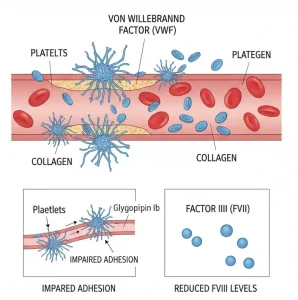Overview
Von Willebrand disease (VWD) is a genetic bleeding disorder caused by a deficiency or dysfunction of von Willebrand factor, a protein essential for blood clotting. This protein helps platelets stick to damaged blood vessel walls and carries clotting factor VIII, which is necessary for forming stable blood clots.
VWD is the most common inherited bleeding disorder and can range from mild to severe. People with the condition may experience prolonged bleeding after injuries, surgery, or dental procedures. While often lifelong, symptoms can usually be managed effectively with medical care.
Symptoms
Symptoms of von Willebrand disease vary depending on the type and severity but commonly include:
-
Frequent nosebleeds
-
Easy bruising
-
Heavy or prolonged menstrual bleeding in women
-
Prolonged bleeding from cuts or injuries
-
Excessive bleeding after surgery, dental work, or childbirth
-
Small red or purple spots on the skin (petechiae)
-
Blood in urine or stool in severe cases
Mild cases may have few noticeable symptoms and may only be detected during surgery or trauma.
Causes
Von Willebrand disease is caused by mutations in the VWF gene, which affect the production or function of von Willebrand factor. These mutations are usually inherited from one or both parents. Types of VWD include:
-
Type 1: Partial quantitative deficiency of von Willebrand factor (most common)
-
Type 2: Qualitative defect in von Willebrand factor
-
Type 3: Severe deficiency or absence of von Willebrand factor (rare)
VWD is generally present from birth, though symptoms may not appear until later in life.
Risk Factors
Risk factors for von Willebrand disease include:
-
Family history of VWD or other bleeding disorders
-
Genetic inheritance (autosomal dominant for Type 1 and 2; recessive for Type 3)
-
Being female, due to menstrual bleeding revealing symptoms more clearly
Complications
If untreated or poorly managed, VWD can lead to complications such as:
-
Severe blood loss from injuries, surgery, or childbirth
-
Anemia due to chronic bleeding
-
Joint damage from repeated internal bleeding in severe cases
-
Increased risk of bleeding during medical procedures
-
Reduced quality of life due to chronic bleeding and related health issues
Prevention
While von Willebrand disease cannot be completely prevented because it is inherited, certain measures can help manage and reduce the risk of complications:
-
Regular monitoring and follow-up with a hematologist
-
Avoiding medications that can worsen bleeding, such as aspirin or nonsteroidal anti-inflammatory drugs (NSAIDs)
-
Prompt treatment of injuries and bleeding episodes
-
Preoperative planning and prophylactic treatment before surgery or dental procedures
-
Education about recognizing early signs of bleeding and seeking timely care
With appropriate management, most people with von Willebrand disease can lead normal lives and effectively control bleeding episodes.
Advertisement

